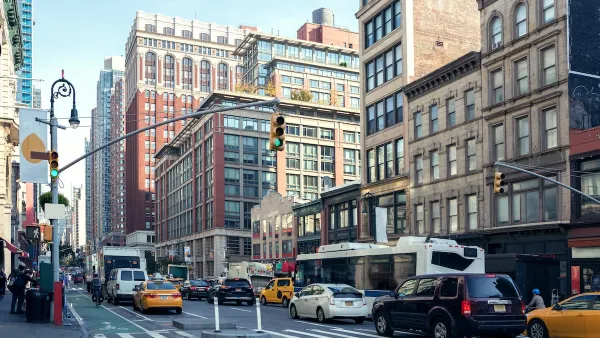Charles Komanoff reveals a revised new plan that aims to bring congestion pricing to New York City and use its revenue to reduce the price of transit.
"Cities like London, Stockholm, and Milan have demonstrated the power of road pricing to reduce driving and cut travel times, pollution damages, crash costs, and the like. But even those gains pale beside the profusion of benefits for New York City promised by a new plan I've developed with Ted Kheel."
"The Kheel-Komanoff Plan (so named to distinguish it from the "pure" Kheel Plan approach, with 100 percent-free transit) delivers all this with just four measures:"
1. A new toll on car and truck trips into Manhattan's Central Business District (CBD), ranging from $2 to $10 for cars, depending on time of day and day of week. Trucks -- bigger and more polluting than cars -- will pay double. Revenues, after netting tolling costs: $1,230 million.
2. A surcharge on medallion taxi fares. To ensure that Manhattan residents, who drive across the CBD line relatively little but use taxis regularly, pay their fare share, we hike taxi fares by a third and allocate the proceeds to transit. Revenues: $440 million.
3. Smart transit fares. We eliminate subway fares at night and on weekends, reduce them except during the a.m. and p.m. peaks, and abolish bus fares altogether. Benefits include a 15-20 percent speedup of local bus service from eliminating queuing to pay fares, less rush-hour crowding as some subway trips time-shift out of the peak, and higher overall transit usage. Cost: $1,610 million.
4. A hike in non-Manhattan bridge tolls. While not primarily a traffic-reduction measure, a 20 percent rise in tolls on outlying New York City bridges will raise $170 million and pay for elimination of all fares on intracity express bus and commuter rail service. "
FULL STORY: The freedom fee

Planetizen Federal Action Tracker
A weekly monitor of how Trump’s orders and actions are impacting planners and planning in America.

Map: Where Senate Republicans Want to Sell Your Public Lands
For public land advocates, the Senate Republicans’ proposal to sell millions of acres of public land in the West is “the biggest fight of their careers.”

Restaurant Patios Were a Pandemic Win — Why Were They so Hard to Keep?
Social distancing requirements and changes in travel patterns prompted cities to pilot new uses for street and sidewalk space. Then it got complicated.

Platform Pilsner: Vancouver Transit Agency Releases... a Beer?
TransLink will receive a portion of every sale of the four-pack.

Toronto Weighs Cheaper Transit, Parking Hikes for Major Events
Special event rates would take effect during large festivals, sports games and concerts to ‘discourage driving, manage congestion and free up space for transit.”

Berlin to Consider Car-Free Zone Larger Than Manhattan
The area bound by the 22-mile Ringbahn would still allow 12 uses of a private automobile per year per person, and several other exemptions.
Urban Design for Planners 1: Software Tools
This six-course series explores essential urban design concepts using open source software and equips planners with the tools they need to participate fully in the urban design process.
Planning for Universal Design
Learn the tools for implementing Universal Design in planning regulations.
Heyer Gruel & Associates PA
JM Goldson LLC
Custer County Colorado
City of Camden Redevelopment Agency
City of Astoria
Transportation Research & Education Center (TREC) at Portland State University
Camden Redevelopment Agency
City of Claremont
Municipality of Princeton (NJ)




























